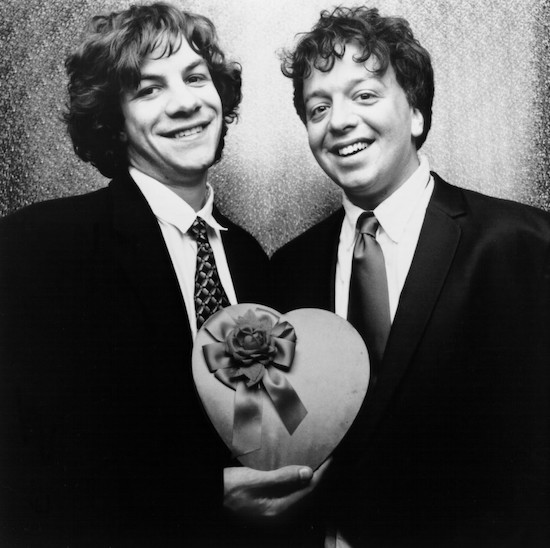Ween
When recently dusting off my CD copy of Quebec, originally purchased back in 2003, I became convinced that Gene Ween and Dean Ween are the best songwriting partnership since John Lennon and Paul McCartney. Perhaps that should read were, but we’ll get to that later. Admittedly, this epiphany did occur mid-lockdown, when I was months-deep into nightly home measures of whisky (ie bucket-sized), starved of non-virtual platonic companionship, and becoming so obsessed with making my own pizza dough that when mentioning this newfound hobby during a Skype interview with the drummer from scary avant-metal duo The Body, I blurted out the words "Are you proud of me?" I’ve just listened back to the recording of this excruciating bid for approval. He was very polite about it. Bless him. That part of the conversation did not make the edit.
"Lennon and McCartney?!" I hear you cry, while spitting your mouthful of Twinings’ Lapsang Souchong across the room like Regan MacNeil and accidentally soaking your 12-LP expanded box set of Past Masters. Fair enough. Hear me out.
It’s usually more common to see Ween likened to Frank Zappa. Yes, both parties are known for their (often off-colour) humour. Their work straddles numerous different styles and genres to the point that questions of intent and authenticity blur into a big mush of confusion. Both have been inspired by urine, gravy and other fluids. Yet Ween are no fans of the moustachioed hot rat, and they balk at comparisons. Growing up, Gene Ween had a passing interest in The Mothers Of Invention, but not Zappa’s vast array of solo material, whereas Dean Ween doesn’t like Zappa at all. He never has done. He finds Frank too "sarcastic" and "showoff-y". Deaner’s got a point. "A lot of times he’s making fun of this genre he’s playing," he told Boston radio station WBUR News in 2017. "It’s not sincere enough for me." He then cited two key Ween influences who balanced things better: "I think The Beatles without the humour is not The Beatles at all. Prince without the humour would suck; it has to be in there."
Funny movies don’t win the prestigious awards and nor do funny books. Comic geniuses reach peak acclaim only when they have ticked off a straight acting part by playing a woman-stalking psychopath. (What does that tell us about "civilised" society?) The stand-up performances that attract the greatest number of column inches are not the objectively funniest ones but those that "reveal" the most detail about the personal life of the given on-stage narcissist. (Reader, I typed the requisite autobiographical material in this piece through gritted knuckles. Or, rather, "JR" did, for he is the "Dean Ween" or "Gene Ween" equivalent of the real "me" and finds intentionally mixed metaphors amusing. The prick.) The humorous sides to The Fab Four and His Royal Badness have to be swept under the carpet, lest their position in the hallowed pantheon of musical legend be called into question. Likewise, other artists will repress the funny side of their personalities in their ongoing quest for approval, because they have noticed the sidelining of those who do raise laughter in their work. Surely, it is more sincere for musicians to actually show their funny side, at least some of the time and presuming it exists. Few cultural commentators see it that way, preferring to identify purported "honesty" in works of prefabricated po-facedness.
Note: Ween are not a comedy or novelty act. "We’re just a band with a sense of humour," Gene Ween told CMJ New Music Report in the year 2000. Ween were promoting White Pepper at the time, its title a hybrid of two Beatles classics. Ween’s work has most in common with The Beatles’ later (and greater) work. It was when making Sgt. Pepper’s Lonely Hearts Club Band and their self-titled double album (AKA The White Album) that The Beatles’ penchant for parody and pastiche became particularly pronounced. The White Album, especially, is packed with satire, self-referential mockery, amusingly incongruous shifts in style and mood, piss-taking impersonations of other artists and playful genre tryouts. It’s a pretty funny album at times, and you’d have to be a frothy-mouthed madman, like Charles Manson, to take it too seriously. Many of the most successful of these moments came from the imagination of The Best Beatle, Paul McCartney, whose ‘Back In The USSR’ opens Side A in style by drawing on the pop-music patriotism of Chuck Berry and The Beach Boys but celebrating instead the illicit sexiness of the Soviet Union. Writing about this track, the music journalist (and comedy writer) David Quantick noted that humour is "a quality that is always underrated in pop and rock, in which suicidal determination and hard-faced romanticism are more popular than the ability to find things ridiculous".
Pastiche continued to be a feature of McCartney’s work with Wings and beyond, albeit to less critical praise. By 1978, wrote biographer Howard Elson, "Paul seemed content with aping the various styles of music that had become McCartney favourites." Another common criticism of McCartney is that he doesn’t put enough "personal" material into his songs. Compared with John Lennon, who self-mythologised himself as a more honest, more real, more MANLY songsmith, McCartney has often written in character and in other ambiguous ways. Ween, who have been known to cover both The Beatles and Wings, are similar. Like McCartney, they have also thrown in the odd straightforwardly revealing moment. Take their occasional breakup songs, for instance, (‘Birthday Boy’; ‘It’s Gonna Be (Alright)’) or their songs about each other (‘I Saw Gener Cryin’ In His Sleep’; ‘What Deaner Was Talkin’ About’). These prove all the more touching, exactly because of the…


